
Crime is a social phenomenon. It is a social wrong committed by an individual. There is no exact definition of crime in the Indian Penal Code, 1860. Crime is what the law defines it to be.
A criminal wrong differs from a civil wrong as criminal wrong is a wrong committed against society due to its serious character. In comparison, civil wrong is a wrong committed against an individual.
In this law note, we will discuss the stages involved in committing a crime.
4 Stages of Crime
There are a few steps involved in the commission of a crime. When a person intentionally commits a crime, there are four stages to consider:
1. Criminal Intention
The first stage in committing a crime is to have criminal intent. Intention refers to doing anything with one’s will, desire, voluntariness, dishonesty, and for a specific reason.
Important: Individuals are not punished for their evil thoughts or unlawful intentions under the law. In other words, criminal intent is the first stage in committing a crime. But criminal intent alone cannot be punished until any crime has been committed with that intent.
Illustration: For example, if a man drives rashly and recklessly, causing an accident that results in a person’s death, the irresponsible driver cannot claim innocence by claiming that he never intended to kill the victim. It could be correct in the true sense. However, a reckless driver should be aware that reckless driving is likely to cause injury to others on the road and even result in death.
As a result of the code’s definition of the word “voluntarily,” a reckless driver who kills someone can be presumed or deemed to have intended to kill that person.
Must Read: Difference Between Motive, Intention and Knowledge
2. Preparation
Preparation refers to arranging all the essential steps to carry out the intended criminal act. Preparation is not unlawful in itself since it is difficult to prove that the essential preparations were made for the commission of the crime. However, in some exceptional circumstances, mere preparation is also punished.
Preparation When Punishable
When the offence is regarded as a serious offence, preparation to commit offences is penalised under the Indian Penal Code. A few of them are mentioned below:
- Warfare preparations against the government (Section 122 of IPC).
- Preparing coins or government stamps for counterfeiting (Sections 233 to 235, 255, and 257 of IPC).
- Having counterfeit money, fraudulent documents, or fake weights and measurements (Sections 242, 243, 259, 266).
- Making plans to commit dacoity (Section 399 of IPC).
3. Attempt
The third stage in the conduct of a crime is “attempt”, and it is punishable. The crime of attempting has been recognised as a preliminary offence.
Section 511 of the IPC does not define the term “attempt”, although it does impose a penalty for attempting to commit an offence. After making necessary preparations, an attempt is defined as a direct step towards the commission of a crime.
When a person intends to commit a crime, he first formulates an intention, then makes preparations, and lastly acts to achieve the goal. If he succeeds in his goal, he is guilty of a complete offence; otherwise, he is merely guilty of attempting.
It should be noted that whether an act constitutes an attempt to commit a specific crime is a question of fact that is decided by the nature of the crime and the procedures required to commit it. The act that constitutes an attempt must be in sync with the desired outcome.
The sections on attempt in the IPC can be classified into three broad categories:
(i) Sections in which the conduct of an offence and the attempt to commit an offence are dealt with in the same section. In which there is the same punishment for both offence and the attempt.
Offences against the state include waging or attempting to wage war against the Indian government, assaulting or attempting to assault the president or governor with the intent to compel or limit the exercise of lawful power, sedition, and dacoity, among others.
(ii) Those offences in which the attempt to execute specific offences is dealt with alongside the actual offences. But separate and distinct punishments have been provided for the attempt. For example, attempting to commit a crime punishable by death or life imprisonment, such as robbery or murder.
(iii) Suicide attempts are particularly covered by section 309 of the IPC.
4. Commission of Crime or Accomplishment
Committing the crime is the final step in the process. If the accused succeeds in his attempt, he commits a crime and will be found guilty of it.
If he fails, he will only be charged with attempting. If the crime is complete, the offender will be tried and punished as per the specific provisions provided in the Indian Penal Code.
Read Next:
1. 7 Categories of Crime as Per the Indian Penal Code
2. Can a Person Commit Theft of His Own Property?
3. List of Important Sections of IPC
4. What is Common Intention – Section 34 IPC
- 13 Characteristics of a Company Under the Companies Act - 5th March 2024
- Lee vs Lee’s Air Farming Ltd – Case Explained - 5th March 2024
- Relevant Facts Under the Indian Evidence Act - 14th January 2024







